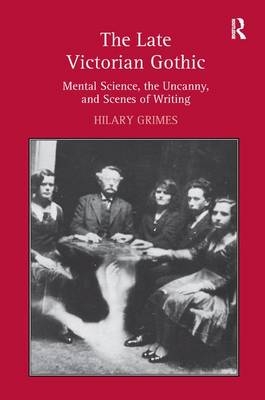
The Late Victorian Gothic
Mental Science, the Uncanny, and Scenes of Writing
Seiten
2011
Routledge (Verlag)
978-1-4094-2720-9 (ISBN)
Routledge (Verlag)
978-1-4094-2720-9 (ISBN)
Examining the automatic writing of the spiritualist seances, discursive technologies like the telegraph and the photograph, various genres and late nineteenth-century mental science, this book shows the failure of writers' attempts to use technology as a way of translating the supernatural at the fin de siecle.
Examining the automatic writing of the spiritualist séances, discursive technologies like the telegraph and the photograph, various genres and late nineteenth-century mental science, this book shows the failure of writers' attempts to use technology as a way of translating the supernatural at the fin de siècle. Hilary Grimes shows that both new technology and explorations into the ghostly aspects of the mind made agency problematic. When notions of agency are suspended, Grimes argues, authorship itself becomes uncanny. Grimes's study is distinct in both recognizing and crossing strict boundaries to suggest that Gothic literature itself resists categorization, not only between literary periods, but also between genres. Treating a wide range of authors - Henry James, Rudyard Kipling, Arthur Conan Doyle, George Du Maurier, Vernon Lee, Mary Louisa Molesworth, Sarah Grand, and George Paston - Grimes shows how fin-de-siècle works negotiate themes associated with the Victorian and Modernist periods such as psychical research, mass marketing, and new technologies. With particular attention to texts that are not placed within the Gothic genre, but which nevertheless conceal Gothic themes, The Late Victorian Gothic demonstrates that the end of the nineteenth century produced a Gothicism specific to the period.
Examining the automatic writing of the spiritualist séances, discursive technologies like the telegraph and the photograph, various genres and late nineteenth-century mental science, this book shows the failure of writers' attempts to use technology as a way of translating the supernatural at the fin de siècle. Hilary Grimes shows that both new technology and explorations into the ghostly aspects of the mind made agency problematic. When notions of agency are suspended, Grimes argues, authorship itself becomes uncanny. Grimes's study is distinct in both recognizing and crossing strict boundaries to suggest that Gothic literature itself resists categorization, not only between literary periods, but also between genres. Treating a wide range of authors - Henry James, Rudyard Kipling, Arthur Conan Doyle, George Du Maurier, Vernon Lee, Mary Louisa Molesworth, Sarah Grand, and George Paston - Grimes shows how fin-de-siècle works negotiate themes associated with the Victorian and Modernist periods such as psychical research, mass marketing, and new technologies. With particular attention to texts that are not placed within the Gothic genre, but which nevertheless conceal Gothic themes, The Late Victorian Gothic demonstrates that the end of the nineteenth century produced a Gothicism specific to the period.
Hilary Grimes is an independent scholar living in Massachusetts, USA.
Contents: Introduction; (Ghost)writing Henry James: mental science, spiritualism and uncanny technologies of writing at the fin de siècle; Sensitive to the invisible: photography and the supernatural in the Holmes stories, Arthur Conan Doyle's spiritualism and Francis Galton's composite portraits; Identities and powers in flux: mesmerism, hypnotism and George Du Maurier's Trilby; Ghostwomen, ghostwriting; Case study: Vernon Lee, aesthetics and the supernatural; Balancing on supernatural wires: the figure of the new woman writer in Sarah Grand's The Beth Book and George Paston's A Writer of Books; Postscript; Bibliography; Index.
| Erscheint lt. Verlag | 23.9.2011 |
|---|---|
| Verlagsort | London |
| Sprache | englisch |
| Maße | 156 x 234 mm |
| Gewicht | 498 g |
| Themenwelt | Geisteswissenschaften ► Sprach- / Literaturwissenschaft ► Anglistik / Amerikanistik |
| Geisteswissenschaften ► Sprach- / Literaturwissenschaft ► Literaturgeschichte | |
| Geisteswissenschaften ► Sprach- / Literaturwissenschaft ► Literaturwissenschaft | |
| Studium ► 1. Studienabschnitt (Vorklinik) ► Med. Psychologie / Soziologie | |
| Naturwissenschaften | |
| Sozialwissenschaften ► Soziologie | |
| ISBN-10 | 1-4094-2720-X / 140942720X |
| ISBN-13 | 978-1-4094-2720-9 / 9781409427209 |
| Zustand | Neuware |
| Informationen gemäß Produktsicherheitsverordnung (GPSR) | |
| Haben Sie eine Frage zum Produkt? |
Mehr entdecken
aus dem Bereich
aus dem Bereich


